“Women’s culture is exploding,” announced an article in the second issue of the short-lived women’s music magazine “Paid My Dues.” It was 1974, and Olivia Records, a collective formed by 21-year-old Judy Dlugacz and four friends a year prior with a $4,000 loan and zero experience, was announcing its existence and calling for help: “[Lesbians] are expressing ourselves in a multitude of ways and we are affecting people and changing lives because of it. Unfortunately, our efforts are either inaccessible to large numbers of women, or they are controlled by men.” Olivia wanted to step in and start their own system before the already-existing-system gobbled up the music that was giving so many women so much life. They wanted to employ women as engineers, producers, financial managers, promoters, distributors, accountants, lawyers and musicians. They wanted women to be in charge of getting music that “speaks from all our experiences and towards all our thoughts and emotions” to the women who needed to hear it.
Financial independence from the patriarchy was a primary goal of lesbian feminism, because true liberation required not relying on men for anything, including money. It’s a tricky thing to pull off now and was even harder back then. But, somehow, Olivia did it. It wasn’t easy, and it eventually required a complete pivot, shifting their focus in the early ’90s from recording to travel. But 40 years later, they are the biggest lesbian-owned lesbian-targeted business out there, making it perhaps the most successful lesbian business story in American history.
The slow extinction of dedicated virtual and real spaces for queer and lesbian women has been a hot topic over the last few years as lesbian bookstores, bars and magazines have shuttered at alarming rates. Often it is men at the helm of the larger companies that choose to close their lesbian properties, but survival generally isn’t much easier for companies that have chosen to go it without any male involvement, either.
Olivia Records experienced enormous success, but even that enormous success was barely enough to make ends meet. “We lived together, worked together,” Olivia CEO Judy Dlugacz told me. “I would get my expenses dealt with and have $15 of spending money left over for the first 5-7 years of Olivia.”

Some Olivia Records releases
Olivia provided countless women with training and support to become recording artists and technicians and went through a lot of evolution and transformation, including abandoning its initial collective structure and expanding at one point with a short-lived side label. “Nothing stopped us,” Dlugacz recalled. “Not the change in relationships, nothing stopped us. Because we believed so strongly that this would work and it did. [Our sales were] unheard of for an independent label and it happened because there was such a need for what we were doing. It was an explosion of consciousness.”
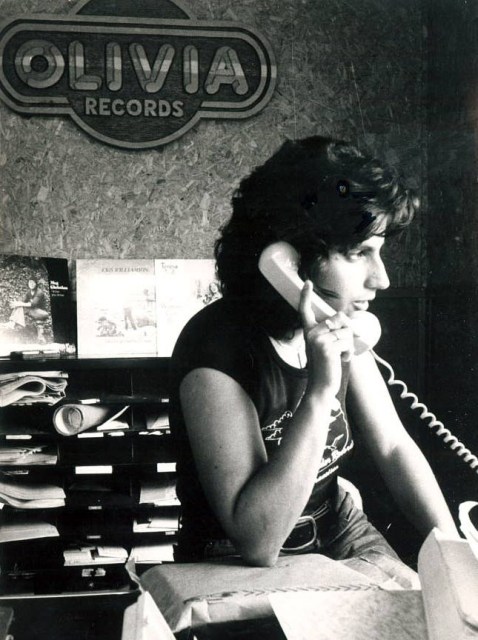
Judy Dlugacz, doing business
In 1982, Olivia hosted two sold-out 10th anniversary shows at Carnegie Hall, starring Cris Williamson and Meg Christian. It was, then, the venue’s largest single-grossing event of all time. Not that there was any press around this achievement, of course. Olivia survived on the passion of its own fans, ostracized as they often were from mainstream attention, recognition, or support. “We’re small,” Dlugacz said of the lesbian community. “We’re a small slice of the population. Community has to support you or you won’t be there.”
Still, even as the label grew and became increasingly powerful and well-known, the women of Olivia were still barely getting by. “After 1982 it was really hard,” Dlugacz told Hot Wire magazine in 1994. “[Olivia] kept going because, quite literally, the artists and I wouldn’t let it go. We simply didn’t let it go. From every standpoint, it probably should have stopped around the tenth year. Between the tenth year and the seventeenth year was very, very difficult. Money-wise it was impossible, Olivia was financially not viable. But we did everything we could to stay around, because there was no question the need was there.”
“As a record company we made about 40 albums of music, sold 2 million records and hundreds and hundreds of concerts and had pretty nice sized mailing list,” Dlugacz told me. Then, in 1989, an attendee at one of their concerts suggested, “wouldn’t it be great to have a concert on the water.” Judy was lit up with the idea: “I went, oh my god, that’s the next thing to do! Place a concert on the water, on a cruise. I was thinking about doing it around the Bay. I was thinking, Oh my God, vacations for women. I can do that.”
In 1990, Dlugacz put down a $50,000 deposit to charter a cruise ship and wrote to Olivia fans announcing a 4-day trip to the Bahamas. Within a few weeks, 600 women had signed up. They decided to add a second back-to-back cruise to the itinerary to meet demand, and that one filled up real quick too. In October, they hosted a Halloween Cruise to the Eastern Caribbean, and returned to the Bahamas twice in 1991. Passengers were thrilled to experience a space where it was truly safe to be who they were, and meet like-minded women. They also were drawn to the vacations for the opportunity to see performances by Olivia recording artists. Performers on the first voyage included Dianne Davison, Donyell Carter, Teresa Trull, Deidre McCalla, Tret Fure, Lucie Blue Tremblay and Cris Williamson. The shows were emceed by comedian Marga Gomez.
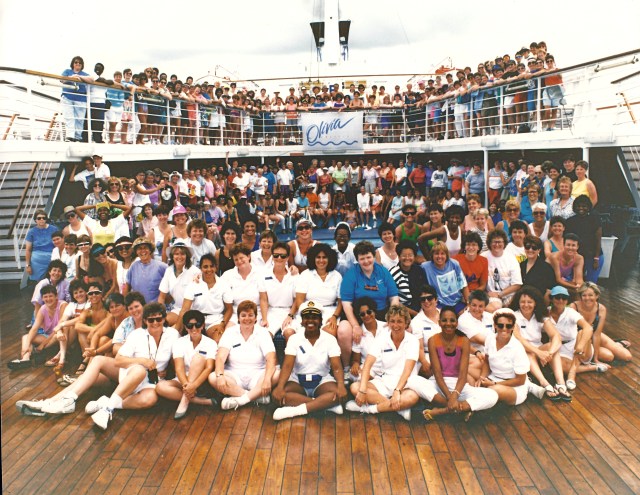
Olivia’s Maiden Voyage, February 1990 (courtesy of Olivia Travel)
By 1994, the company had nine full-time and three-part time employees with an annual budget of $4 million, according to an article in Hot Wire magazine. Half their income came from the cruise business, and music and catalog sales accounted for a quarter each. “Olivia — with her artists — has reached more lesbians than any other institution in the world, and has helped change their lives,” Dlugacz declared in a speech at their 20th Anniversary concert in 1993. “Olivia has helped open the closet doors for so many, and has removed the isolation and stigma for so many more who thought they were the only ones. We had virtually no help from the recording industry or the media, who saw us as an enigma and so often as a personal threat.”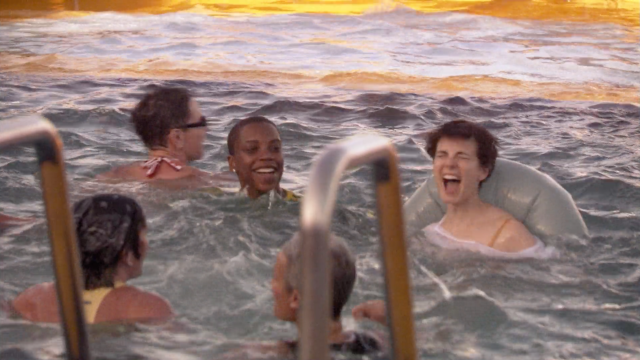
The last CD produced and distributed by Olivia Records was 1993’s “Postcards from Paradise,” featuring Cris Williamson & Tret Fure. Coincidentally, Olivia’s future would entail sending a lot of postcards from paradise, as the travel wing of the enterprise continued to flourish while the “women’s music” movement was picked up by the mainstream. Olivia’s artists paved the way for other musicians working in the genre to go big, like Tracy Chapman and k.d. Lang.
Meanwhile, Olivia was chartering more and more vacations every year to pretty much everywhere in the world: China, Africa, The Galapagos Islands, The Spanish Riviera, Australia, Tahiti and even Antarctica. Dlugacz told me they had to do a lot of work with the cruise crews, even though many were hesitant to charter to a lesbian group, worried that they’d lose more conservative customers if they caught wind of it. Now companies are eager to charter to Olivia, and she recognizes that “we helped to really change the whole world of travel from a very homophobic one — even internally, in terms of their own staff.” It felt like a natural evolution from what Olivia had done in the music industry, where they also changed the perception of what women could do and what they could pay.
In 2000, when Olivia cruisers singlehandedly rescued a lagging Turkish economy by spending over half a million dollars over three days and three ports-of-call, other ports paid attention and were eager to welcome cruisers to their shores, too. And in 2002, Olivia Recording Artists Meg Christian and Cris Williamson reunited for a concert — their first together since the Carnegie Hall show. Other Olivia vacations have featured talent like Sarah McLachlan, kd lang, Wanda Sykes, Melissa Etheridge, Lily Tomlin, Margaret Cho, Ruby Rose, The Indigo Girls, Mary Chapin Carpenter, Whoopi Goldberg, Martina Navratilova and Leisha Hailey.

In 2004, Olivia partnered with The L Word for a memorable second season episode that truly features Peak Jenny as well as Alice and Dana’s bold forays into sexual role-play. In 2006, Olivia announced record annual revenues of $20 million. Throughout it all, the company remained both charitable and politically active, recently raising money for Hillary Clinton and formerly partnering with a gay male cruise company in 2010 to form the American Red Cross LGBT Haiti Relief Fund. In 2012, Judy Dlugaz was appointed to Obama’s LGBT Leadership Council.
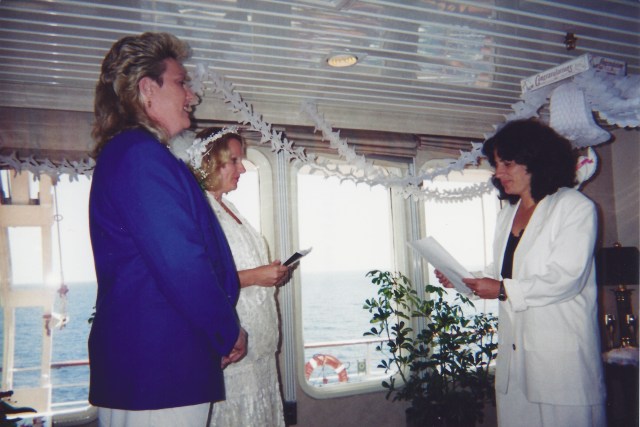
Judy performs a marriage ceremony onboard an Olivia Cruise in 1993
According to Dlugacz, the best part of every trip remains the same for her: “when someone comes up to me and they don’t just thank me, they say Oh my God I had no idea how it felt to be in such a freeing environment where lesbians are the majority, I can’t imagine going home and not being like this, my life has changed forever in these seven days.”
But in the early days, Olivia’s work wasn’t just about making a safe place for lesbians to connect with each other, it was also to spread the Lesbian Feminist gospel that the purest form of feminism for all women was one that didn’t rely on men for romantic relationships, either. Dlugacz explained, “We didn’t have any money but we had to do it because we believed this is the way, music is such a powerful way, we believed that if every woman knew about Lesbian Feminism, they’d all come out, and the world would change.”
That particular belief isn’t as popular these days as it once was, and that’s just one of many things that have changed rapidly over the course of Olivia’s lifetime. But even now when acceptance is very high in certain parts of the country, many lesbians still have to remain closeted for their survival, and most lesbians can really benefit psychologically from the freedoms one experiences in a lesbian-exclusive space.
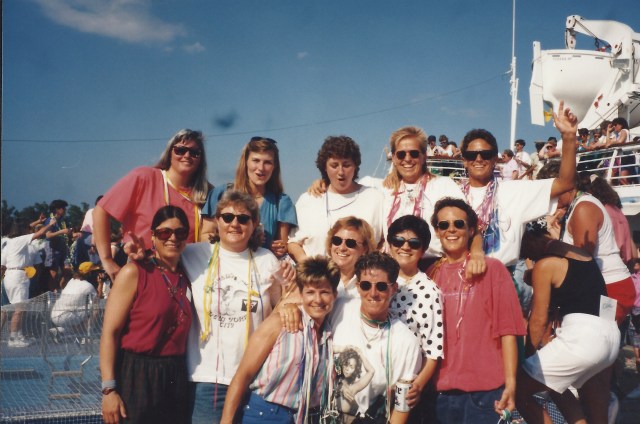
Cruisers in 1993
“When we started Olivia we were a bunch of radical lesbian feminists,” she remembers. “I’d just gotten out of college and we were an amazing group of women who loved music and you know, it was an incredible time to be coming out. But at the same time we understood that if we wanted to do something we wouldn’t burn out on, we had to have an economic component where people actually made a living doing the work.”
This is where the cavern between the dream and the reality opens up and swallows lesbian businesses whole. But Olivia made a deliberate pivot… and survived.
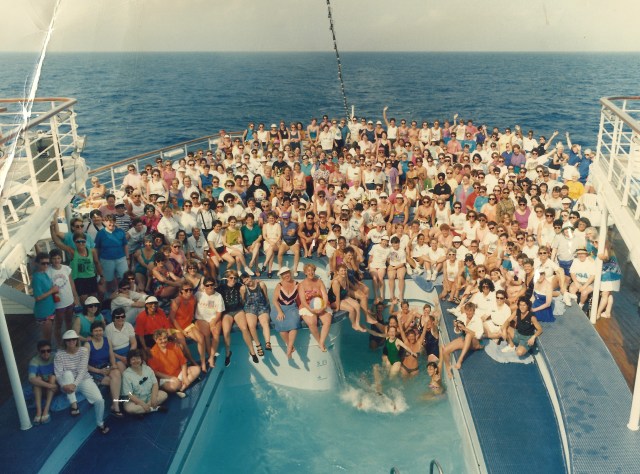
It bears mentioning that in our short lifespan, we’ve undergone a similar evolution: we brought people together via the internet, via the words we shared online with a growing community of readers. We didn’t have concerts, we had meet-ups. The way we decided to bring everybody together from all over the world wasn’t on a boat, but atop a mountain. And soon enough, that wing of our business became way more profitable than the original (this website). With the help of A+ memberships, we hope to keep both going strong for as long as possible.
At the end of our interview, Judy had some encouraging words about Autostraddle. “I think that what you guys are doing is really important and revolutionary,” Judy told me. “You’re keeping the connection and community alive in another way. There aren’t the same routes for lesbians to connect that there were when we started. When we started it was concerts, it was music. Records were the first internet, they were a way lesbians could connect and know there were other lesbians out there. It was an opportunity to connect, and what you’re doing is creating opportunities to be aware and to connect. That’s absolutely essential. Or we’ll just go back to being isolated.”
We’re super excited to be partnering with Olivia, and can’t wait to hang out with all these amazing women at the beginning of November in Ixtapa, Mexico! Need a last minute vacation? Come join us!
Dates: November 5th–12th 2016
Where? The all-inclusive Club Med Resort in Ixtapa, Mexico.
What? Beaches, pool parties, lesbian trivia, butch yoga, comedy nights, dancing, drinking with a bajillion queer women. Plus jungle excursions, kayaking and pool volleyball for all the sporty queers (I see you!).
Who? Riese, Abby, Kaylah and Sarah are gonna be there, plus a whole other cast of queer ladies, including Cameron Esposito and Rhea Butcher.
Cost: For solo travelers, Olivia is offering $999 with the code AS16. Find out more here. Olivia is also offering a Gal Pal discount, which means if you bring another human, it’s $699 each. Call (800) 631-6277 and mention code AS16.
Discover more about the entertainment, lodging and vacation here.


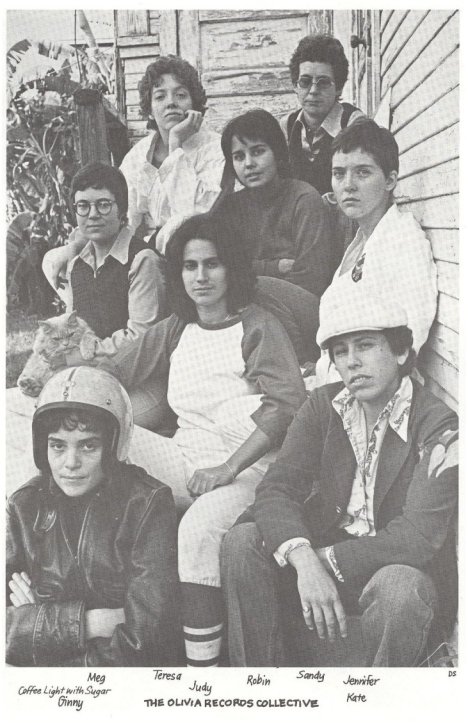
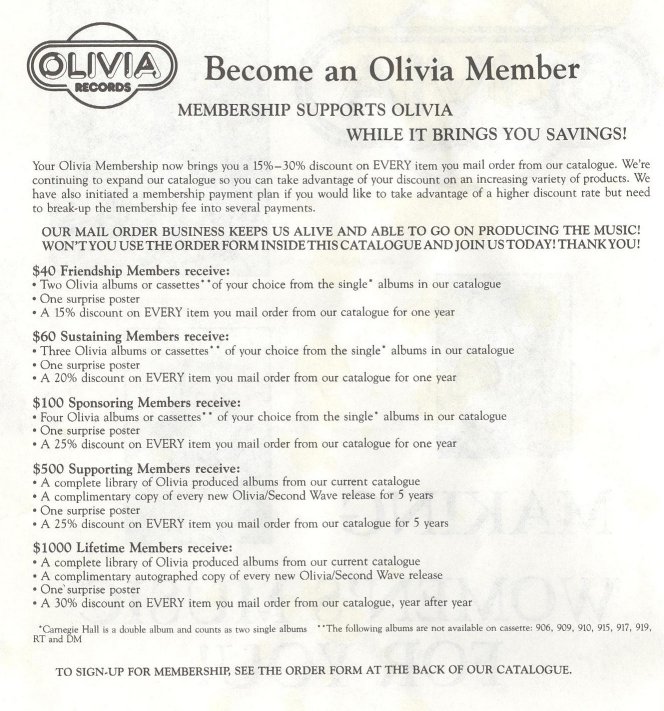

Damn it, now I want to go on a cruise…
Olivia Records saved my sanity, inspired whole bunches of Aussie women to make their own music including me :) … it was a heady time … and they survived … we survived. :) … I still even have a few of their LP’s in the collection!
OMG. If I had the vacation time left this year (and wasn’t already going to be on a trip to New York), I’d totally be there! Can’t wait to hear about it.
great team building ideas…..looks adorable…..thanks for sharing
Great read! I had no idea about any of this.
great article.This trip sounds amazing. Totes can’t afford it right now, but I hope everyone who goes has a great time.
So, obviously not all radical feminism/lesbian feminism/radical lesbian feminism is trans-exclusive (and while those movements are currently infested with that sort of bigotry, they didn’t start out that way.) But I probably wasn’t the only person seeing those terms and thinking, uh, are they TERFS?
Fortunately, the short answer is “it’s very unlikely.”
The long answer is “I can’t find anything about their current policies, but they had a lot of trouble in the 70s when they stood with a trans collective member against TERFs.” Details are here: http://transadvocate.com/terf-violence-and-sandy-stone_n_14360.htm though if you’re not in a place to read about TERFs or violent threats, this basically is an article about those things.
If anyone from Olivia is reading this, it might be a good idea to clarify a policy of inclusion somewhere on your site?
Just to make you aware, you can definitely find out about Tret Fure’s politics and beliefs through her website, music, and social media. She has even written a song about our son who is trans. <3
incredible article.
awesome article.This trip sounds astounding. Totes can’t manage the cost of it right now, yet I trust or appraisal everybody who goes has an extraordinary time.